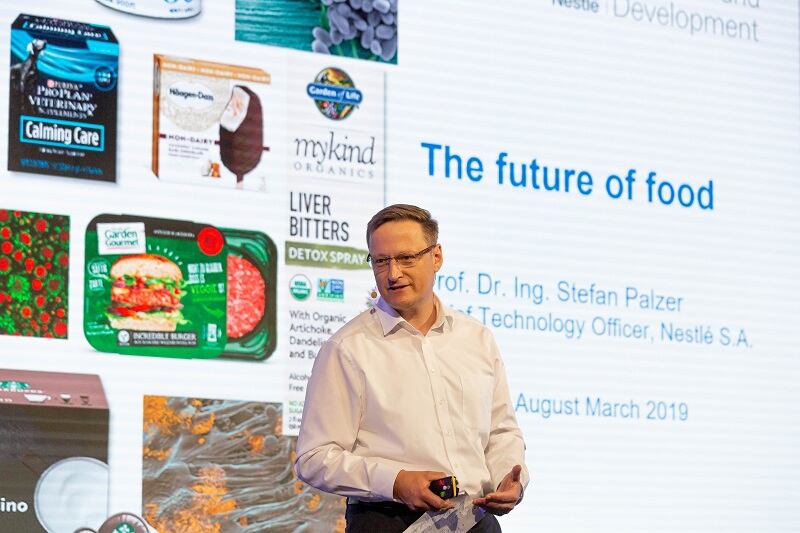IOFI is an international trade association representing some of the world’s largest flavour houses and hundreds of small and medium enterprises affiliated to the IOFI member associations. Its core mission is to promote the global trade of safe, compliant and responsibly produced flavours ingredients. This is achieved through scientific research, advocacy and communication.
The association was formed 50 years ago, in 1969. Since then, the food sector has undergone a process of radical change in terms of the technologies available and the markets open to it as well as the consumer expectations around quality, nutrition and responsible sourcing.
These are indeed exciting times for the flavours sector, according to IOFI executive director Sven Ballschmiede. “One of the most exciting aspects of working within the flavour industry is the constant innovation. Shifting consumer demands, evolving and unanticipated supply chain challenges, and new technologies have combined in unique ways for the industry and created an ‘innovation space’ where our members have learned to compete and thrive,” he told FoodNavigator.
Proving that necessity is the mother of invention, flavours makers have grappled with some of the significant challenges they have faced over the years to produce ingredients that meet the needs of their customers and consumers.
Like all industries, the flavours sector has had its ‘fair share of challenges’, which have evolved with the markets it serves. So, what are the biggest issues facing the sector today?
‘Communicating complexities in a world accustomed to soundbites’
The flavours industry is one that prides itself on the safety and quality of its science-based flavour solutions. However, Ballschmiede noted, the sector finds itself grappling with the challenge of a consumer base that has grown increasingly skeptical of processed foods and ingredients that are seen as artificial.
Ballschmiede points to the irony of this: “Some of these challenges can be seen as somewhat contradictory, which increases their complexity. For example, product safety is an absolute requirement when you’re talking about food and while flavouring substances are well-regulated and backed by robust and sound science, many people in the world today are skeptical about scientific information.
“Communicating the complexities of safety and science in a world now accustomed to soundbites and tweets carries its own set of challenges.”

To overcome these, IOFI takes a ‘proactive’ stance in the areas of science, advocacy and communication to ‘help build trust in the industry and transparency in all that we do’, Ballschmiede said.
Nevertheless, cynicism on the part of the consumer has resulted in the rise of the clean label trend. There is a view that ingredients must be sourced from nature if they are to be label-friendly.
In a world of finite natural resources, this brings its own trials.
Supporting sustainability: IOFI’s new Sustainability Charter
Responsible sourcing, then, is a must for flavour houses. Beyond the moral obligation, the business case for building sustainable models is clear. Consumers are increasingly concerned about specific environmental issues, ranging from climate change to carbon emissions.
Food manufacturers, too, are looking closely at their supply chains to reduce their environmental impact. For example, Nestlé, has said it wants to be carbon neutral by 2050 and this ambition includes scope one, two and three emissions. As the group’s head of operations, Magdi Batato, recently told us, this could well include de-listing suppliers who fail to prove their sustainable credentials.
“We also see a strong increase in the demand for natural ingredients that must be sustainably and responsibly sourced. This leads to an increased strain on the supply of raw materials, and this must be closely managed. IOFI works to support its members [in this area],” Ballschmiede said.
As IOFI progresses this agenda it is working on a new Sustainability Charter that its members will be able to sign up to, Ballschmiede revealed. “We are also very active in getting our Sustainability Charter up and running, an initiative which we have launched together with our colleagues from the International Fragrance Association (IFRA). This initiative is voluntary for our members and supplements their own existing programs, but could be of great value for the industry as a whole.”
The Charter will be officially launched early 2020 at the latest.
Globalisation and multi-localism: The regulatory puzzle
Another focus area, one that IOFI has witnessed noteworthy change in, is helping its members navigate an increasingly complex global regulatory landscape.
IOFI will be hosting a celebration of its work over the last 50 years – and the future prospects of the flavours sector – at a members only event in Brussels later this week. We’ll be bringing you exclusive coverage from the event in the coming weeks as IOFI looks to the future of food and flavours.
While the forces of globalisation have seen the flavours sector advance into high growth emerging markets, on the one hand, there has also been a swing to a more complex regulatory landscape, on the other. And with compliance always an unnegotiable priority, IOFI has been able to assist its members in this regard.
“Over time, the regulatory environment that covers flavourings, foods and beverages has evolved from one primarily influenced by the US and EU regulatory approaches to a multi-faceted patchwork of different national regulatory frameworks. For IOFI and our members, this means that we must constantly adapt and adjust, and this is an area where we can provide guidance and support to our members,” Ballschmiede explained.
A ‘good example’ of this is the work IOFI is undertaking in the Asia Pacific region. “Our strategic roadmap in this region is focused on building a cohesive, convergent regulatory framework rather than a fragmented one. This means collaborating closely with associations in various markets to promote the IOFI Code of Practice and the IOFI Global Reference List.
“We will continue to intensify the outreach to countries in this region, and in other regions such as Latin America where we have a strong working group, to promote our safety approaches and best practices.”
But it isn’t just emerging markets where regulatory shakeups can have far-reaching consequences.
Back in 2008, the European Parliament backed the Food Improvement Agents Package, which includes a regulation on flavourings. It sets out rules on flavourings versus food ingredients with flavouring properties. This led to the creation of the EU Positive list of flavourings listing all the materials approved by the European Risk Assessor (EFSA).
“We continue to make progress with the EU evaluation program. This has been ongoing for a number of years, and working closely with the European Flavouring Association (EFFA) we have been able to make significant progress. Many critical substances have been cleared by EFSA. We’ll continue to focus on this until the program comes to a close, which we believe will be in the very near future,” Ballschmiede revealed.
“This is a great example of how the flavours industry has worked together to ensure the continued safe use of flavours, which furthers both the interests of our members and protects consumer health.”




